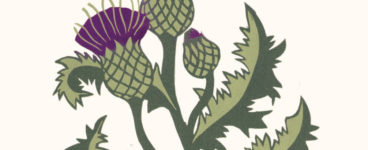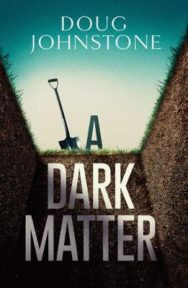‘It’s dark, existential stuff, but funny too, hopefully. It starts with a car crashing into an open grave, and features a one-eyed dog called Einstein and a cat called Schrodinger. Obviously.’
Doug Johnstone is one of Scotland’s most prolific writers, amassing a backlist of thrillers that play with the genre while taking you on a storytelling rollercoaster! His latest novel, The Big Chill, is the second in a trilogy based around a family of funeral directors and private investigators and is every bit as entertaining as his previous novels. BooksfromScotland chatted to Doug about his favourite books.
The Big Chill
By Doug Johnstone
Published by Orenda Books
The book as . . . memory. What is your first memory of books and reading?
I was madly into the Asterix books as a kid, I loved the anarchic humour and nonsensical violence in them. I’m sure I learned a lot of history and geography from them too, although much of that was nonsense of course. Asterix and Obelix were the perfect double act, really, brains, brawn, and the best of friends.
The book as . . . your work. Tell us about your latest book The Big Chill. What can we expect from the Skelf women this time round?
This is the second part of a trilogy about the Skelf women, three generations who run a funeral directors and a private investigators. They’re reeling from events in the first book, and trying to make sense of their place in the world, while still caring for the deceased and bereaved, and solve cases that come their way. It’s dark, existential stuff, but funny too, hopefully. It starts with a car crashing into an open grave, and features a one-eyed dog called Einstein and a cat called Schrodinger. Obviously.
The book as . . . inspiration. What is your favourite book that has informed how you see yourself?
It might seem like a weird choice but I’m going for The Wasp Factory by Ian Banks. OK, it’s a mad, macabre horror story, but it was written about people living not far from me, and I understood their lives and how they spoke and interacted with each other. It was a revelation to me that you could write a story about people like us, from nondescript Scottish east coast towns set in the present day. Before that I presumed literature had to be about posh, dead people.
The book as . . . a relationship. What is your favourite book that bonded you to someone else?
I didn’t get on well with my English teacher at school (see the above comment about literature and posh, dead people). My dad had been an English teacher, and he could see I was interested in fiction, but as a teenage boy I wasn’t exposed to anything I could relate to. This was years before YA existed, sadly. Anyway, he handed me a copy of Raymond Carver’s collected stories, Where I’m Calling From, and it changed my life. I was totally blown away. That book makes me think of my dad and how he nudged me towards the right path all those years ago.
The book as . . . object. What is your favourite beautiful book?
I’m going to cheat and have two. The first is Tales from the Loop by Simon Stalenhag. It’s a graphic novel, I guess, and kind of retro-futuristic science fiction, about strange things happening in the vicinity of an underground loop near a small Swedish town in the 1980s. It’s just gorgeous, the juxtaposition of everyday life and weird robots and entities is beguiling.
I also want to give a shout out to Adrian Tomine’s Killing and Dying. It’s a collection of graphic short stories, and just a beautiful combination of understated drawing skill and storytelling. Each tale is beautiful and heartbreaking in equal measure.
The book as . . . entertainment. What is your favourite rattling good read?
One of my favourite writers on the planet is Sara Gran. She’s best known for her crime novels, but she also wrote a horror novella called Come Closer which is possibly my favourite book of all time. It’s about a woman who is either possessed by a demon or having a psychotic breakdown, it’s not clear which, and it cracks along at an unbelievable pace, as well as being genuinely disturbing. It’s so cleanly written, so simple and precise but full of impact too.
The book as . . . a destination. What is your favourite book set in a place unknown to you?
Judith Schalanksy produced a book a few years ago called Atlas of Remote Islands. It’s subtitled ‘Fifty Islands I have not visited and never will’ and it’s an absolutely gorgeous creation, with precise and beautiful illustrations of fifty very remote islands, alongside strange wee narratives concerning each one. It’s just the most lovely thing to look at, and really makes me yearn for places I’ll never visit.
The book as. . .education. What is your favourite book that made you look at the world differently?
Again, I’m going to cheat and pick two quite recent reads, but they’re kind of related. The first is The Overstory by Richard Powers, a novel set amongst the lives of trees across America. It is a massive, extraordinary work, that really made me consider trees in an entirely different light, as well as ecology and the concept of time. Related to that, in my mind at least, is Sue Burke’s Semiosis, which is a first contact science fiction novel, about a crew who land on a faraway planet, only to discover sentient and intelligent plant life controlling their environment. Both books are mind boggling and made me rethink what I know about the nature of intelligence and life itself.
The book as . . . the future. What are you looking forward to reading next?
I’m reading loads of science fiction at the moment, and have a big pile more waiting to be read. Of them, I think the one I’m most excited about is This is How You Lose the Time War by Amal El-Mohtar and Max Gladstone. It’s won a bunch of awards recently, and is about two rival time-travelling agents whose gradual communications change them. I’m loving the big ideas of science fiction right now and although this is a short book, it will hopefully pack a punch.
The Big Chill by Doug Johnstone is published by Orenda Books, priced £8.99.
ALSO IN THIS ISSUE

 Cauld Blasts and Clishmaclavers
Cauld Blasts and Clishmaclavers
‘Each family has its Scots words or phrases, helping to maintain or establish bonds of kinship.’

 The Book According to…Doug Johnstone
The Book According to…Doug Johnstone
‘It’s dark, existential stuff, but funny too, hopefully. It starts with a car crashing into an open …














